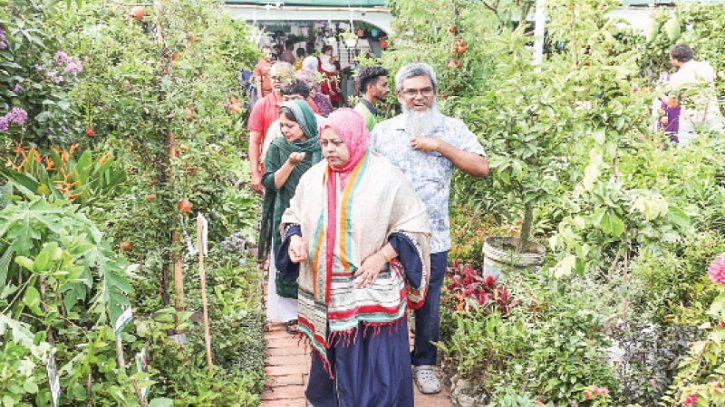
At 12:15 PM on Friday, the old trade fair ground in Agargaon was buzzing with excitement as the National Tree Fair 2025 welcomed hundreds of visitors, including a special sight—Afshana Begum, a woman in her sixties, was seen bargaining from her wheelchair at the Messrs Bashida Nursery stall. Accompanied by her grandchildren and family members, she bought saplings worth Tk 11,300 to plant in her home garden in Adabor.
The fair saw an exceptional turnout due to the public holiday. Families, school and college students, and plant enthusiasts thronged the venue, taking photos, learning about plants, and purchasing a wide variety of saplings.
The National Tree Fair 2025, which began on June 25 and runs until July 24, is being organized by the Forest Department under the slogan: "Let’s Plan for Greener Bangladesh through Planned Afforestation." The fair remains open every day from 9 AM to 9 PM.
This year, the demand for exotic fruit trees has been remarkably high, according to sellers. The venue showcases a vibrant collection of fruit, flower, ornamental, and medicinal plants. Visitors are welcomed by blooming blossoms and lush greenery, including native and foreign species alike.
Some popular fruit saplings include mango, gooseberry, blackberry, guava, starfruit, wood apple, longan, rambutan, durian, jackfruit, pomelo, sapodilla, lychee, pomegranate, cherry, Indian jujube, strawberry, pear, lotkon, rose apple, and avocado. The fair also features over 200 bamboo varieties, cacti, bonsai, indoor plants, and date palms.
Saurav Shuvo, a college student from Uttara, came with friends and shared, “I love plants and visit this fair every year. I have many plants in my room and balcony. We also have a rooftop garden. I’ll return with my parents to buy more.”
Aminul Islam, a salesperson at Messrs Bashida Nursery, said small potted fruit trees bearing visible fruits are in high demand, especially for balconies and rooftops. He highlighted exotic species such as ‘Ruby Longan’ priced at Tk 12,000 and a specially imported pomegranate from Indonesia priced at Tk 15,000—larger and tastier than local varieties.
According to the Forest Department’s information center at the fair, the purpose of the Tree Fair goes beyond sales. Its core mission is to promote environmental awareness and biodiversity conservation. This year, the fair includes 112 stalls, with 92 nurseries and additional booths for coffee, snacks, ice cream, and meals.
Messrs Palli Nursery Center from Shibpur, Narsingdi, also reported strong visitor response. Salesperson Kamrul Islam shared that they offer various rose saplings priced between Tk 200 and Tk 900.
Khalid Hossain, owner of Winner Nursery, showcased a rare bonsai banyan tree worth Tk 100,000. “Bonsai trees are often bought by hobbyists for homes and offices,” he explained, adding that many saplings are imported or cultivated locally from imported seeds and grafts. A Thai pomelo tree with pink inner flesh is priced at Tk 7,000. Other popular plants include oleander (Tk 400), Iranian orange (Tk 1,500), and a rare jackfruit tree from a mix of Sri Lankan, Indian, and Bangladeshi breeds with pink-colored sweet fruit, priced at Tk 15,000.
At the Energy Pack Agro Ltd. stall, coconut and betel nut saplings from Malaysia, Sri Lanka, Vietnam, Myanmar, and local BARI-4 varieties were available, priced between Tk 400 and Tk 2,000. Vietnamese betel nut saplings cost Tk 400, while Burmese ones were sold at Tk 150. A Thai sapodilla tree was priced at Tk 9,000.
While trees can be planted year-round, the rainy and autumn seasons—particularly Asharh, Srabon, Bhadra, and Ashwin—are considered the best months for planting in Bangladesh, thanks to adequate rainfall, light, and favorable temperatures.
Although the National Tree Fair usually begins on World Environment Day (June 5), this year’s event was rescheduled to June 25 due to Eid celebrations.





